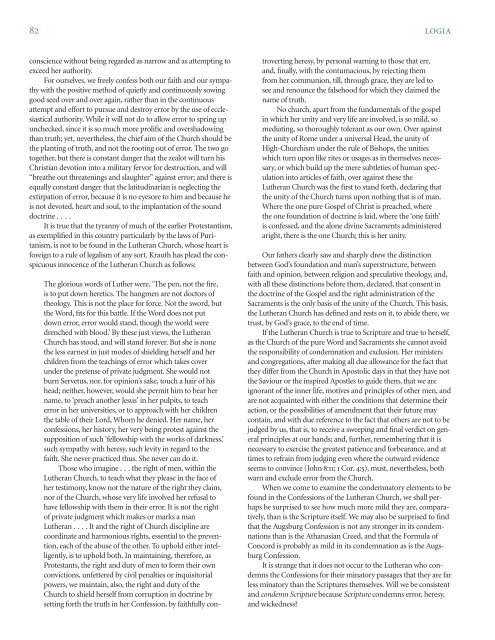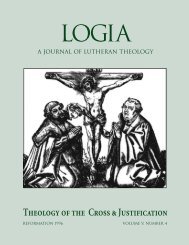04-2 Hermeneutics.pdf
04-2 Hermeneutics.pdf
04-2 Hermeneutics.pdf
- No tags were found...
You also want an ePaper? Increase the reach of your titles
YUMPU automatically turns print PDFs into web optimized ePapers that Google loves.
82 LOGIAconscience without being regarded as narrow and as attempting toexceed her authority.For ourselves, we freely confess both our faith and our sympathywith the positive method of quietly and continuously sowinggood seed over and over again, rather than in the continuousattempt and effort to pursue and destroy error by the use of ecclesiasticalauthority. While it will not do to allow error to spring upunchecked, since it is so much more prolific and overshadowingthan truth; yet, nevertheless, the chief aim of the Church should bethe planting of truth, and not the rooting out of error. The two gotogether, but there is constant danger that the zealot will turn hisChristian devotion into a military fervor for destruction, and will“breathe out threatenings and slaughter” against error; and there isequally constant danger that the latitudinarian is neglecting theextirpation of error, because it is no eyesore to him and because heis not devoted, heart and soul, to the implantation of the sounddoctrine . ...It is true that the tyranny of much of the earlier Protestantism,as exemplified in this country particularly by the laws of Puritanism,is not to be found in the Lutheran Church, whose heart isforeign to a rule of legalism of any sort. Krauth has plead the conspicuousinnocence of the Lutheran Church as follows:The glorious words of Luther were, ‘The pen, not the fire,is to put down heretics. The hangmen are not doctors oftheology. This is not the place for force. Not the sword, butthe Word, fits for this battle. If the Word does not putdown error, error would stand, though the world weredrenched with blood.’ By these just views, the LutheranChurch has stood, and will stand forever. But she is nonethe less earnest in just modes of shielding herself and herchildren from the teachings of error which takes coverunder the pretense of private judgment. She would notburn Servetus, nor, for opinion’s sake, touch a hair of hishead; neither, however, would she permit him to bear hername, to ‘preach another Jesus’ in her pulpits, to teacherror in her universities, or to approach with her childrenthe table of their Lord, Whom he denied. Her name, herconfessions, her history, her very being protest against thesupposition of such ‘fellowship with the works of darkness,’such sympathy with heresy, such levity in regard to thefaith. She never practiced thus. She never can do it.Those who imagine . . . the right of men, within theLutheran Church, to teach what they please in the face ofher testimony, know not the nature of the right they claim,nor of the Church, whose very life involved her refusal tohave fellowship with them in their error. It is not the rightof private judgment which makes or marks a manLutheran .... It and the right of Church discipline arecoordinate and harmonious rights, essential to the prevention,each of the abuse of the other. To uphold either intelligently,is to uphold both. In maintaining, therefore, asProtestants, the right and duty of men to form their ownconvictions, unfettered by civil penalties or inquisitorialpowers, we maintain, also, the right and duty of theChurch to shield herself from corruption in doctrine bysetting forth the truth in her Confession, by faithfully con-troverting heresy, by personal warning to those that err,and, finally, with the contumacious, by rejecting themfrom her communion, till, through grace, they are led tosee and renounce the falsehood for which they claimed thename of truth.No church, apart from the fundamentals of the gospelin which her unity and very life are involved, is so mild, somediating, so thoroughly tolerant as our own. Over againstthe unity of Rome under a universal Head, the unity ofHigh-Churchism under the rule of Bishops, the unitieswhich turn upon like rites or usages as in themselves necessary,or which build up the mere subtleties of human speculationinto articles of faith, over against these theLutheran Church was the first to stand forth, declaring thatthe unity of the Church turns upon nothing that is of man.Where the one pure Gospel of Christ is preached, wherethe one foundation of doctrine is laid, where the ‘one faith’is confessed, and the alone divine Sacraments administeredaright, there is the one Church; this is her unity.Our fathers clearly saw and sharply drew the distinctionbetween God’s foundation and man’s superstructure, betweenfaith and opinion, between religion and speculative theology, and,with all these distinctions before them, declared, that consent inthe doctrine of the Gospel and the right administration of theSacraments is the only basis of the unity of the Church. This basis,the Lutheran Church has defined and rests on it, to abide there, wetrust, by God’s grace, to the end of time.If the Lutheran Church is true to Scripture and true to herself,as the Church of the pure Word and Sacraments she cannot avoidthe responsibility of condemnation and exclusion. Her ministersand congregations, after making all due allowance for the fact thatthey differ from the Church in Apostolic days in that they have notthe Saviour or the inspired Apostles to guide them, that we areignorant of the inner life, motives and principles of other men, andare not acquainted with either the conditions that determine theiraction, or the possibilities of amendment that their future maycontain, and with due reference to the fact that others are not to bejudged by us, that is, to receive a sweeping and final verdict on generalprinciples at our hands; and, further, remembering that it isnecessary to exercise the greatest patience and forbearance, and attimes to refrain from judging even where the outward evidenceseems to convince (John 8:11; 1 Cor. 4:5), must, nevertheless, bothwarn and exclude error from the Church.When we come to examine the condemnatory elements to befound in the Confessions of the Lutheran Church, we shall perhapsbe surprised to see how much more mild they are, comparatively,than is the Scripture itself. We may also be surprised to findthat the Augsburg Confession is not any stronger in its condemnationsthan is the Athanasian Creed, and that the Formula ofConcord is probably as mild in its condemnation as is the AugsburgConfession.It is strange that it does not occur to the Lutheran who condemnsthe Confessions for their minatory passages that they are farless minatory than the Scriptures themselves. Will we be consistentand condemn Scripture because Scripture condemns error, heresy,and wickedness?
















